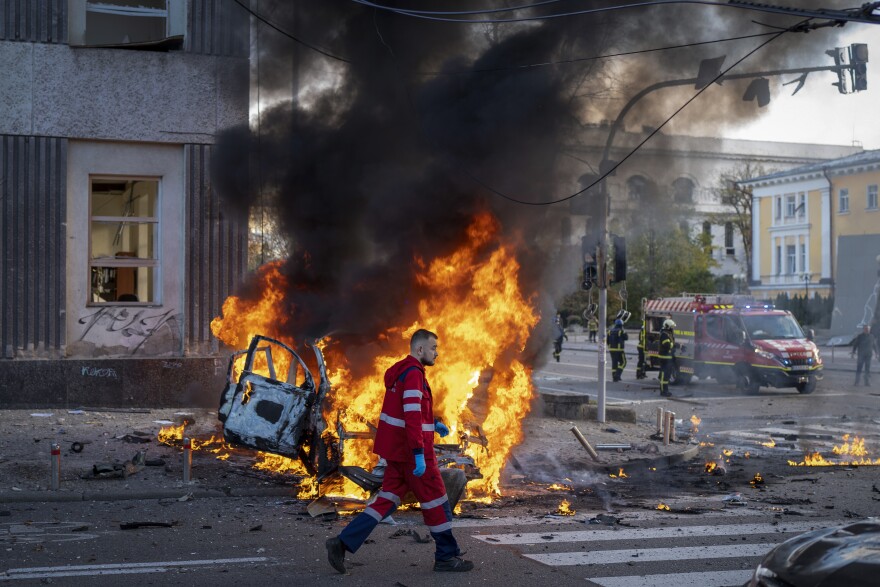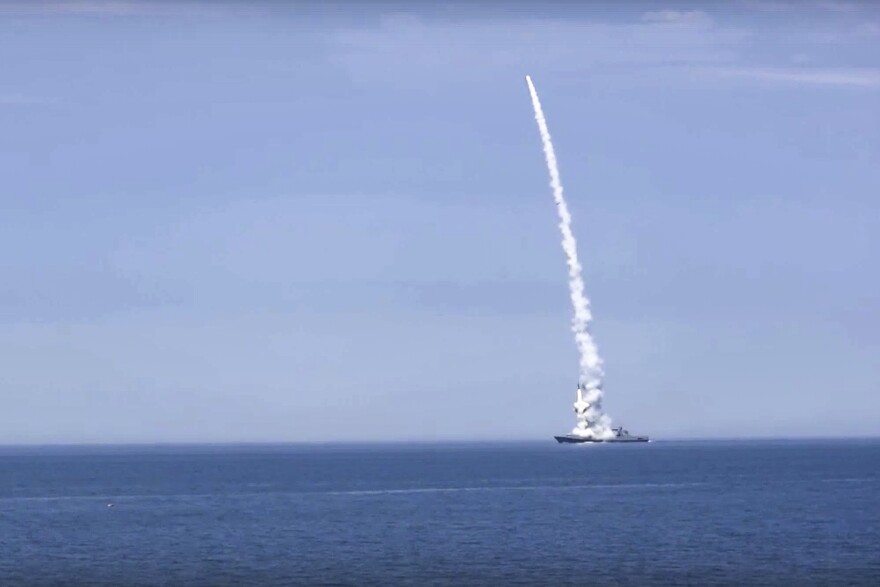For decades, the threat of nuclear armageddon has kept Russia and the West out of a direct confrontation. The prospect of global nuclear war has been a line that neither side is willing to cross.
But now, analysts who study Russia's nuclear strategy say they are increasingly worried that this stark nuclear line is becoming blurred. As Russia's conventional war in Ukraine falters, thanks in large part to Western weapons and training, some see an effort to bend nuclear deterrence to fit the current conflict. Others say that long-standing policies in Russia might encourage nuclear use to prevent it from losing the war.
With neither side showing signs of backing down, the possibility of a nuclear strike appears more real than it has in decades.
"We are at this fairly dangerous junction," says Pavel Podvig, a senior researcher at the U.N. Institute for Disarmament Research who tracks Russia's nuclear forces. Podvig says he thinks the likelihood Russia would use a nuclear weapon is "extremely low." But he adds, "I do worry."
Diverging Doctrines
At the height of the Cold War, both the U.S. and the Soviet Union amassed enormous stockpiles of nuclear weapons. Many were so-called "strategic" weapons — large warheads delivered by submarines and intercontinental ballistic missiles — and designed to be used in a global thermonuclear war.
But the two nations also had thousands of "tactical" nuclear weapons that could be smaller in size and were able to be delivered by planes, short-range missiles or even artillery. NATO powers prepared to use such weapons, for example, if they were faced with an overwhelming conventional Soviet attack on Western Europe.
By the 1990s, the U.S. had largely given up on tactical nuclear weapons. New, more precise conventional weapons had the same long-range strike capability with none of the radioactive fallout. And the tactical nukes were seen as a security risk — because they were smaller and more portable, terrorists might more easily get their hands on one.
Russia, however, decided to keep its tactical arsenal, says Anya Fink, a research scientist at the Center for Naval Analysis who has studied Russian nuclear doctrine. The decision has been driven in large part by what the Russian military sees as a vast gap in conventional weapons technology.
"For Russia, nuclear weapons, in particular non-strategic nuclear weapons, are really intended to counterbalance what they see as U.S. and NATO conventional superiority," Fink says.
Today, Russia is believed to have the largest nuclear arsenal in the world, including 1,000-2,000 tactical nuclear weapons, says Hans Kristensen, head of the nuclear information project at the Federation of American Scientists, a Washington think tank. While the public often imagines tactical nukes as smaller weapons, Kristensen says the Russian arsenal is diverse. "They have a very wide range of explosive yields, going up to a couple of hundred of kilotons – so much more powerful than the Hiroshima bomb," he says.
Rattling the Saber
At the start of the Ukraine conflict, Russian President Vladimir Putin put his nuclear forces on a "special mode of combat duty." It was later determined that the move did little more than boost staffing at nuclear weapons sites. Still, as the invasion began, it was a clear reminder to the West of Russia's powerful nuclear deterrent.
To a certain extent, that classic nuclear deterrence has been effective at containing the Ukraine war, says Olga Oliker, the Director of Europe and Central Asia for the International Crisis Group.
"We have seen nuclear deterrence work, on the part of both Russia and Western countries," she says. So far NATO troops are not fighting inside Ukraine, and Russia isn't attacking neighboring NATO countries either.
But as Russia's war has stalled, thanks in large part to supplies from the West, Putin has renewed his nuclear threats. During a speech in late September, as he annexed Ukrainian land, Putin said more directly that he might be willing to consider a nuclear strike in the current conflict.

"In the event of a threat to the territorial integrity of our country and to defend Russia and our people, we will certainly make use of all weapon systems available to us," he said. "This is not a bluff."
Oliker says in part, the renewed talk of nuclear weapons may be an effort to compel the West to reduce or stop its shipments of supplies to Ukraine. In other words, Putin is seeking to push his nuclear deterrence to do more. "Russia keeps trying to have the deterrence go a little bit further," she says.
But the statements also hint that Putin may be trying to expand the territory he can defend with nukes. Russia recently annexed four regions of Ukraine. Fink says Russia's official policy is that it would only use nuclear weapons to defend its own territory:
"The big question is, 'Are the parts of Ukraine that Russia has attempted to join to itself Russian territory or not?'"
Nuclear use
Fink says that she still believes that Putin is unlikely to take the war nuclear. As the drone and cruise missile strikes of the past week illustrate, Russia has plenty of powerful conventional weapons it can use to attack Ukraine.
"There's other ways to make a point to the Ukrainians that don't have to do with the use of nuclear weapons," she says.

But Matthew Kroenig a professor of international relations at Georgetown University thinks that the conflict is moving in a way that may push Putin closer to making that fateful choice. With Ukraine on the offensive, Russia's conventional military forces depleted and a chaotic conscription process underway at home, he says, Putin is likely to face more and more domestic political pressure.
"I think as his position gets more dire, the more willing he might be to gamble for resurrection with nuclear use," Kroenig says.
If Russia did decide to respond with a nuclear strike, most experts agree they wouldn't use their weapons in an attack against frontline Ukrainian troops. Tactical nukes were originally designed to take out big juicy Cold War-era targets: such as columns of armored tanks, or aircraft carriers. Ukraine's forces are spread out. Putin would have to use a bunch of little nukes, which would create a radioactive mess his troops would also have to deal with.
More likely, says Fink, is that Russia would decide to use a single nuclear weapon to try and freeze the conflict. That weapon could be used as a demonstration, over the Black Sea or even at a test site inside of Russia. Or it could be against any one of a number of fixed targets inside Ukraine, such as those the Russian military has hit with cruise missiles and drones in recent days.
Podvig worries that given the resolve of Ukraine and the West, Putin will choose to do something more extreme.
For the use of a nuclear weapon to be shocking, "You really need to make it clear that you are willing to target civilians, and that means, to put it bluntly, killing a lot of people," he says.
Kroenig says that if Russia did use a nuclear weapon in Ukraine, he believes the U.S. would have to respond with force, otherwise "we essentially teach Putin and the world that nuclear coercion pays." He believes a conventional strike, perhaps on the military unit that launched the nuke, would send a powerful message.
Olga Olikar says such a strike would carry huge risks.
"I think the Russians would see a conventional attack on their nuclear capacity, as effectively a nuclear attack," she says. Things could escalate further from there.
But Oliker points out that all of this is still highly theoretical. She hopes that the two sides will still find a way to begin de-escalating the conflict.
"If I try to tell myself a story of how to get there, it requires a whole bunch of leaps and jumps," she says. "But the path to global thermonuclear war also has some leaps and jumps."
Copyright 2023 NPR. To see more, visit https://www.npr.org.







